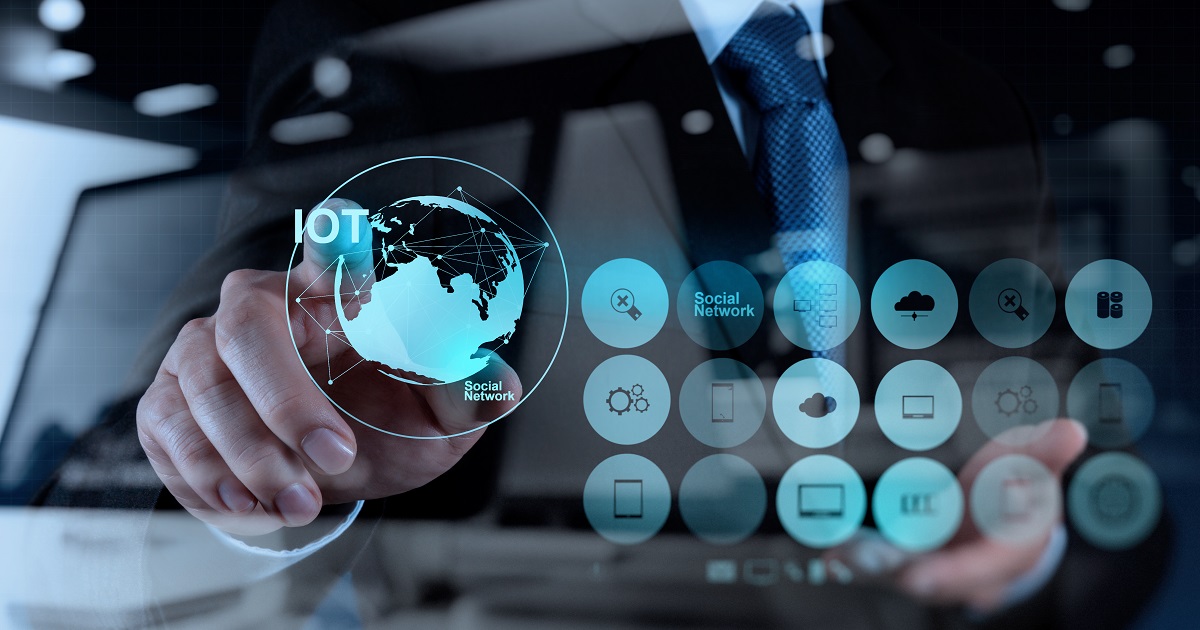
Enterprise Iot
PR Newswire | October 16, 2023
UL Solutions, a global leader in applied safety science, today announced it issued the first Smart System Verified Platinum rating for the SIBCA Connect: Internet of Things (IoT) Platform. SIBCA is a provider of fire, life safety, and information and communication technology (ICT) solutions.
"With our Smart Systems Rating Program, UL Solutions is helping the industry navigate the growing complexity of smart building systems and solidify the definition of a smart product based on features and best practices," said Sudhi Sinha, vice president of Ecosystems and Service Development at UL Solutions. "UL Solutions is pleased to announce that SIBCA has earned the Smart System Verified Platinum rating for their SIBCA Connect IoT Platform. Our Smart Systems Rating, a UL Marketing Claim Verification, helps our customers deliver confidence and peace of mind to buyers and consumers during their decision-making process, which helps them elevate their brand above competitors that self-declare their claims."
UL Solutions evaluated the SIBCA Connect platform using UL MCV 1587, Methodology for Marketing Claim Verification: Smart System Verified to level Silver/Gold/Platinum/Diamond. This assessment — along with evidence from SIBCA — enabled UL Solutions to verify SIBCA's marketing claim about its product.
UL Solutions Smart Systems Rating Program enabled us to demonstrate the level of our SIBCA Connect IoT Platform's smart system claim and differentiate our solution in a competitive and challenging market. We are honored to achieve the first Smart System Verified Platinum rating for our SIBCA Connect platform and be part of this industry-first program, said Ibrahim Lari, chairman and CEO of SIBCA.
UL Solutions evaluates building systems and products according to the Smart System Rating Program across six categories: connectivity and interoperability, control and automation, digital experience, functional value, resiliency and cybersecurity. This assessment is performed based on the specifications published in UL MCV 1587. Each category has different areas of examination reflected in sub-categories, and the examination utilizes science-based methodology against these criteria and the published specification.
Read More

Enterprise Iot, Infrastructure
prnewswire | June 23, 2023
Tuya Smart (NYSE: TUYA, HKEX: 2391), a global IoT development platform service provider, attended the membership meeting hosted by the Connectivity Standards Alliance (hereinafter called the Alliance). As a board member of the Alliance and early participant in Matter, Tuya demonstrated the new achievements of its Solutions for Matter for global developers.
With extensive categories of hardware solutions, Tuya enables customers to build core competitiveness of Matter devices
As the smart home industry continues to grow, more and more brand and channel customers are looking to create Matter devices. To add new Matter devices to existing product categories and create additional features, customers need to make investments. Due to issues such as higher development costs and functions that are alike across device categories, it is challenging for them to enter the market rapidly and establish their own competitive strengths. Thus, Tuya keeps growing its hardware solutions for Matter and offers customized features that customers can add on.
Tuya has obtained official certification for over 100 devices across four major categories: electricity, lighting, gateway, and sensors. The last category includes the most recent certified motion sensors and contact sensors, and its launched hardware solutions cover many smart home categories, such as light bulbs, strip lights, switches, gateways, plug-ins, and sensors. In addition, the Tuya-enabled sample Matter curtain motor will soon start its official certification lab testing phase. Along with the expanding Matter smart home product portfolio, Tuya will also introduce equivalent hardware solutions for smoke sensors, thermostats, and more by collaborating with global developers.
In terms of development capabilities, the powerful Tuya IoT Development Platform can assist developers in achieving independent and controllable Matter device development, giving customers more individualized options, including color temperature control for lighting products, scene mode settings, music, timing, and many other functions for various devices. This is based on Tuya's market expertise and core technical capabilities. By giving end-users a better experience, Tuya will assist customers in building up their competitive strengths as well as increasing their brand value and market influence.
With one-stop access to official Matter device certification, Tuya helps customers quickly seize market opportunities
Customers who develop Matter devices must frequently go through a lengthy certification process before their products are suitable for mass production and the market. Tuya can simplify the certification procedure.
As the Alliance's highest-level member, Tuya possesses several qualifications, including Matter product compliance certificate transfer, similarity certification, and new certification, among others. As a result, all products created using Tuya's Solutions for Matter can be certified quickly and affordably through Tuya's certificate transfer, significantly reducing the time required for certification.
MOMAX SMART, a leading AloT and consumer electronics brand, recently developed the Matter Gateway and Matter LED through Tuya's Solutions for Matter, and obtained the Alliance's Matter certification. "We are so excited to announce our first Matter gateway and Matter LED will be launched this month. The entire process of development and certification was convenient and smooth. We received certification within thirteen business days, considerably enhancing our business progress. Our Innovation Center's experience of working with Tuya's expertise and full process service capabilities was remarkable, and the entire process provided tremendous value for the overseas business. Our Smart IoT Team can't wait to create more Matter products in the future, to embrace the change with Tuya, and expand Matter's penetration in the smart home industry," said John Cheng, CEO of MOMAX SMART.
Numerous customers have embraced Tuya's robust one-stop solutions for developing, testing, and certifying Matter devices. Customers choose Tuya not just for its core strengths in IoT technology, but also for its intense focus on customer needs, as well as Tuya's active collaboration with other ecosystem partners to support customers' Matter devices in achieving cross-protocol and cross-ecosystem integration and development, and solving customers' challenges like integration into the Matter ecosystem for current product categories.
Smart home ecosystems converge, and Tuya enables customers to easily realize cross-protocol, cross-ecosystem interconnection
As an early participant and promoter of Matter, Tuya has worked closely with Amazon, Apple and Google to build cross-protocol and cross-ecosystem device interconnection, allowing customers to manage their devices and mainstream ecosystem devices through one interface. This has opened up a path of interconnection for customers.
First of all, Tuya has introduced an exclusive gateway development framework that supports Matter bridging, in response to customer concerns that non-Matter devices cannot be incorporated into the Matter ecosystem. This means that gateways created by customers via the Tuya IoT Development Platform can convert non-Matter devices into Matter-enabled devices to achieve cross-protocol compatibility.
Secondly, Matter products created by customers can easily integrate with well-known smart home ecosystems. They can quickly become compatible with Amazon Alexa, Apple Home, Google Home, and other mainstream ecosystems. In contrast, end-users can manage and integrate scenes between Matter devices and mainstream smart home devices throughout the entire house using the Tuya-enabled App, as well as realizing multi-mode management via smart speakers, and enjoying richer scene linkage settings and more convenient unified device management.
It is worth mentioning that Matter-certified devices developed by customers through Tuya can apply for the product certification tags of two mainstream ecosystems, which are WA (Works with Alexa) and WWGH (Works with Google Home). Through Tuya's express channel, customers can obtain mainstream ecosystem endorsement and enhance their brand recognition and market influence.
Finally, Tuya is strengthening its relationship with ecosystem partners in order to advance the application of Matter in various spheres. In response to Amazon's introduction of Matter Simple Setup (MSS), Tuya has just recently launched its solutions for MSS. These solutions allow customers to enable end-users to automatically identify Matter devices via Amazon Echo speakers alone, without the need for an App or scanning codes. Tuya has officially finished MSS testing for Tuya-enabled Wi-Fi devices.
Customers are further enabled by Tuya in accordance with the most recent Commissionable Endpoint functionality from Amazon. After adding the device, end-users can use the Tuya-enabled App to immediately synchronize Matter devices to their local region using cloud-cloud synchronization. Thus, end-users can use Amazon Echo speakers to achieve local control of Matter devices even when there is no network connection.
Tuya Smart promotes global win-win cooperation to enhance customers' product power and brand value
In order to give customers a more effective and convenient Matter development and certification process, as well as to assist customers in optimizing the device interaction experience for end-users and enjoying the limitless smart home scenes brought by Matter, Tuya Smart is actively promoting the comprehensive upgrade of Tuya's Solutions for Matter 1.1.
"Our mission to design and develop standards, facilitate market-leading testing and certification processes enables companies and consumers to leverage Matter's seamless compatibility for smart products," said Tobin Richardson, President and CEO of the Connectivity Standards Alliance. "As a board member and promoter, Tuya collaborates with us in technical aspects and market applications, helping to shape a market benefiting both product manufacturers and billions of consumers worldwide. We invite others to join forces with Tuya and our Alliance as we build a secure, interoperable, and user-friendly IoT ecosystem that delivers value to everyone."
Following this Membership Meeting, a number of renowned exhibitions and conferences will feature Tuya's Solutions for Matter in further detail.
Tuya stays committed to enhancing the technical foundation, improving the capabilities of the development platform, optimizing the entire one-stop development process, embracing change with an open and neutral ecosystem, working with brands, channels, ecosystem partners, etc. to continue to expand the global application of Matter, exploring the new development potential of the smart home industry, and working together with partners to build the future of IoT.
AboutTuya Smart
Tuya Smart (NYSE: TUYA) is a leading technology company focused on making our lives smarter. Tuya does this through offering a cloud platform that connects a range of devices via the IoT. By building interconnectivity standards, Tuya bridges the intelligent needs of brands, OEMs, developers, and retail chains across a broad range of smart devices and industries. Tuya solutions empower partners and customers by improving the value of their products while making consumers’ lives more convenient through the application of technology. Through its growing commercial SaaS business, Tuya offers intelligent business solutions for a wide range of verticals. The Company’s platform is backed by industry-leading technology complete with rigorous data protection and security. Tuya partners with leading Fortune 500 companies from around the world to make things smarter, including Philips, Schneider Electric, Lenovo and many others.
Read More

Enterprise Iot, Infrastructure
Quext | February 17, 2023
On February 16, 2023, Quext, one of the most innovative providers of smart technology solutions for the multifamily industry, announced recently that the United States Patent and Trademark Office (USPTO) has awarded five new patents protecting its IoT solution. The new patents bolster the company's patent portfolio and recognize the innovation and originality of Quext IoT's smart home solution.
Quext holds three patents pertaining to its Quext IoT solution. Quext and iApartments are currently involved in patent infringement litigation, with Quext alleging that the Tampa, Florida-based company infringes on the original patents. iApartments contests the validity of Quext's patents on the basis of alleged 'prior art.' Quext also filed an action with the International Trade Commission (ITC) against iApartments to prevent the importation of its white-labeled smart hubs.
The USPTO considered all of iApartments' alleged prior art when granting Quext five new patents and determined that Quext's inventive concepts are novel. Consequently, the new patents strengthen the company's patent portfolio and reaffirm the innovative nature of Quext IoT's solution. Quext utilized one of the new patents recently in a new lawsuit filed in Florida's Middle District against iApartments.
As operators themselves, the company designed its solution with operational efficiencies in mind, addressing pain points by remote lock credentialing, extending lock battery life, and reducing onsite hardware to lower maintenance calls, cost, and disruption. Quext IoT's patented solution has proven to be a thoughtful approach to smart apartment technology in multiple ways. Due to its distinctive network architecture, it is an optimal solution for both new construction and existing property retrofits of all classes.
About Quext
Quext is a smart technology and services enterprise that pioneers exciting innovations that make intelligent decision-making remarkably easy. It reimagined apartment technology with products that work together seamlessly to deliver the most intuitive, user-friendly, all-in-one, cloud-based apartment community hub ever made available. Internet of Things, broadband internet, digital human customer support, and fintech innovations are its fundamental platform innovations. The company, headquartered in Lubbock, Texas, was named the Fierce Wireless IoT Challenge winner in 2020.
Read More